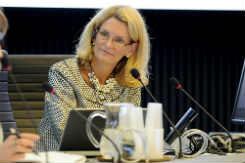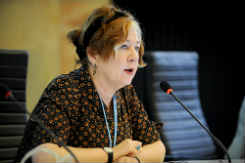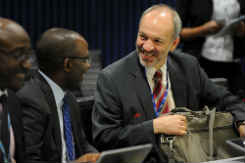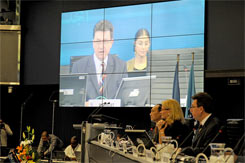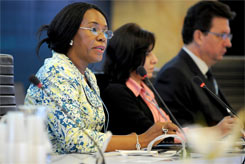
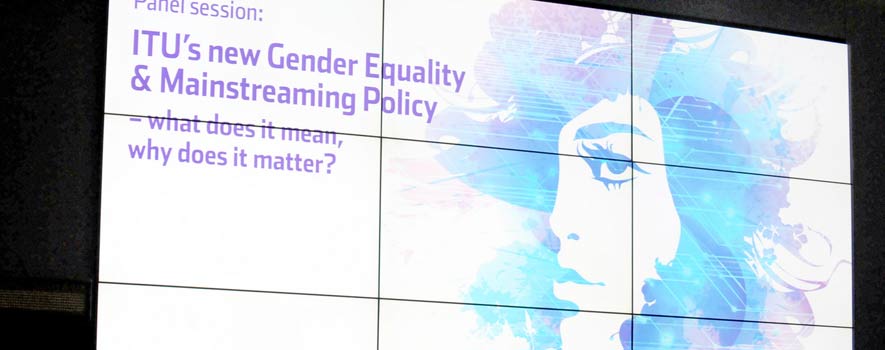
| « Previous | Next » | ||||||||||
|
|
|||||||||||
| Issue No. 5 | Geneva, 17 June 2013 | ||||||||||
|
|
|||||||||||
Council endorses landmark ITU Gender Equality and Mainstreaming PolicyThe Council endorsed a landmark policy to further mainstream gender equality across the whole range of ITU’s strategic plans, activities and programmes. The policy embodies a shared vision for integrating a gender perspective throughout the Union and provides a tool to ensure that gender equality remains a core consideration in implementation of ITU Resolution 70 (Rev.Guadalajara, 2010). In acclaiming the Council’s endorsement of the policy, ITU Secretary-General Dr Hamadoun I. Touré said: ”I believe this will go down as a landmark event in ITU’s development. It is a key element in ensuring that all can reach their full potential.” Doreen Bogdan-Martin, Chief of ITU's Strategic Planning and Membership Department appealed to Member States to contribute to the ITU special fund created to put the gender equality policy into practice. After noting that gender parity in the ICT field could only be achieved if more girls study engineering, Ms Bogdan-Martin encouraged all Member States to present women candidates for ITU posts. Presenting a report (Document C13/39) on ITU activities in relation to implementation of Resolution 70 during the period 2012-2013, Ms Bogdan-Martin noted that they included the organization of the Girls in ICT Day events; the Tech Needs Girls three-year Global Campaign launched on 26 April 2012; the creation of the Broadband Commission Working Group on Gender chaired by the UNDP Administrator, Helen Clark; and several activities carried out with other UN agencies, in particular the newly created UN Women. The report also noted that ITU has started the process of reporting on its implementation of the UN System Wide Action Plan (SWAP) on gender equality and women’s empowerment that it endorsed at the CEB meeting in April 2012.
Conformance and interoperability receives overwhelming supportMany countries took the floor — the United States, Brazil, Saudi Arabia, Tunisia, India, Italy, the Russian Federation, the Republic of Korea and China — all of them expressing their support for ITU’s conformance and interoperability (C&I) programme. The programme is based on four pillars: conformity assessment; interoperability events; capacity building, and establishment of test centres in developing countries. Pillars 1 and 2 are led by the Telecommunication Standardization Bureau (TSB) and pillars 3 and 4 by the Telecommunication Development Bureau (BDT). Reinhard Scholl, Deputy to the TSB Director, reported on progress and future activities of the programme. He said that since the ITU secretariat had issued its progress report (Document C13/24) discussions had taken place in the Radiocommunication Advisory Group (RAG) and the Telecommunication Standardization Advisory Group (TSAG). As a result, the secretariat revised the C&I action plan taking into account these discussions as well as comments made in a contribution from the United States (Document C13/77). Mr Scholl thanked all those who contributed, making the C&I action plan stronger (Document C13/DT/6). WTSA-12 outcome and follow-up: In November 2012, the World Telecommunication Standardization Assembly (WTSA-12) revised Resolution 76 on conformity and interoperability. This revised Resolution instructs the ITU Telecommunication Standardization Sector (ITU-T) to implement the C&I programme action plan agreed by Council 2012. It tasks ITU-T Study Group 11 (Signalling requirements, protocols and test specifications) to coordinate the programme across all ITU-T study groups. At its meeting from 25 February to 1 March 2013, ITU-T Study Group 11 created a working party on “conformance and interoperability testing” and revised the terms of reference of the Joint Coordination Activity on Conformance and Interoperability Testing. ITU-R updates: In June 2012, RAG noted that there were some ITU-R Recommendations that could be used for conformance assessment or interoperability testing. RAG then advised ITU-R study groups to review any such ITU‑R Recommendations and report to RAG in 2013. By its meeting in May this year, RAG had not received any input. ITU-R will continue to collaborate with ITU‑T and ITU‑D on conformance and interoperability testing and provide these Sectors with information when requested. Turning now to the C&I action plan, Mr Scholl gave an update on the implementation of the four pillars. Pillar 1 – Conformity assessment: There are various routes to enter information into the conformity database. Mr Scholl said he was happy to report that a first lab had achieved ISO/IEC 17025 accreditation, meeting the “Route 1” requirement of the ITU Conformity Assessment programme. The accreditation specifically covers Recommendation ITU-T G.8265.1 on timing and synchronization. In March 2013, ITU-T Study Group 11 encouraged the TSB Director to explore possibilities to cooperate with IECEE – the IEC system for conformity testing and certification of Electrotechnical Equipment and Components. IECEE has a wide acclaim in the industry, including telecommunication manufacturers. The Executive Secretary of IECEE gave a presentation to ITU-T Study Groups 11 and 13 in February 2013 and to TSAG during its meeting in June 2013. IECEE has offered ITU to use its platform if the Union’s membership so wishes. A workshop on conformance assessment organized by the World Telecommunication Standardization Collaboration, which is made up of ITU and the International Organization for Standardization (ISO) and International Electrotechnical Commission (IEC), will take place on 21-22 November 2013. Pillar 2 – ITU Interoperability events: The coming months will see a joint ITU-APT interop/showcasing event on NGN, IPTV (Bangkok, 9-12 Sept 2013). Further events planned are a joint ITU-Continua e-health interop/showcasing event; a joint ITU-T/G3-Alliance to test ITU-T G.9903, and a joint ITU-T/Bluetooth interop to test ITU-T P.1100 and ITU-T P.1110 on narrow-band and wideband hands-free communication in motor vehicles. The C&I action plan also contains a call for ITU-T study groups to develop system road maps, identify and define the interfaces across which interoperability is needed, and collaborate with other organizations developing standards for those interfaces. Pillar 3 – Capacity building: The ITU secretariat continues to collaborate with national and international organizations that can assist in capacity building in developing countries to train technical staff and policy-makers on various aspects of interoperability testing, conformance testing and laboratories accreditation. Upcoming events include training on conformance and interoperability for the following regions: the Americas (Campinas, 24-28 June 2013); Forum for Asia-Pacific (Myanmar, 4-6 September 2013); Africa (Tunis, 14-18 October 2013), as well as a sub-regional workshop for Southern African Development Community (SADC) countries to promote the development and implementation of conformance and interoperability programmes. Pillar 4 – Creation of test labs and establishment of C&I programmes in the regions: Memoranda of Understanding have been signed with CERT (Research and Studies Telecommunication Center, Tunisia), CPqD (Brazil), Sintesio (Slovenia), Tilab (Telecom Italia) and ZNIIS (Russian Federation). The ITU secretariat is producing a set of revised guidelines on building testing labs for conformance and interoperability of equipment and systems in developing countries. It continues collaborating with UNIDO, ILAC, IAF and IEC on how they could assist in the establishment of, or partnering with, ICT test centres. It is finalizing a feasibility study for building a type approval testing laboratory for electronic communication equipment. The ITU secretariat is also providing a set of guidelines for the development, implementation and management of mutual recognition agreements. Following this presentation and comments from the floor in support of progress so far, the Council requested that Document C13/24 on “conformance and interoperability programme status report and action plan” be revised as a final text. Welcoming the strong support of the membership for implementation of the C&I action plan after what was at times quite heated debate in the past, Mr Scholl said: “I haven’t heard anything so positive in the past five years. I am glad that we have now gone to smoother waters where we can implement the programme.”
Strengthening regional presenceOn the question of strengthening ITU’s regional presence (Resolution 25, Rev. Guadalajara 2010), many countries welcomed developments in several key areas highlighted in Document C13/25. Work continues to further empower field offices. Measures have been taken with respect to delegation of authority, training and improved connectivity between the field and headquarters. Work efficiency is being improved. BDT processes are reviewed with a view to aligning them to ISO general principles. A project has been developed to improve electronic working methods for regional and area offices. The grade structure has been standardized and staffing levels have been reviewed accordingly. Meanwhile, the capacity of field offices continues to be strengthened in specific areas of expertise through recruitment of associate technical experts and support staff under regional initiatives and projects. Cooperation with ITU regional and area offices and relevant regional organizations continues to improve. An example of this is the coordination between the General Secretariat, the three Bureaux and the regional offices in preparing ITU global meetings. Brazil, while appreciative of this progress sought additional information in line with Resolution 25. Reports to the Council should contain more information on “the evolution and development of activities, including implementation of projects and regional initiatives, seminars/workshops, event participation, regional preparatory meetings and attraction of new Sector Members” (Document C13/72). Many countries supported Brazil’s request. While acknowledging the request by Brazil and the Council, support for measures taken by ITU to strengthen its regional presence, the secretariat recalled the various elements of information that are actually already being provided to membership in relation to the actions and activities that the field offices are performing in the implementation of the ITU mandates. First, Member States are informed on activities carried out in the region through the Regional Development Forums, which also provide an opportunity for Member States and Sector Members to review the consolidated regional initiatives and provide further guidance on implementing projects which fall under these initiatives. Second, additional information can be found in the BDT operational plans which are available to membership on the BDT website. Third, the Quarterly Performance Report contains additional information (financial and operational). This report is also posted on the ITU-D website. BDT Director, Brahima Sanou, pointed out that, in line with the results-based management, the approach adopted so far has been to report on results rather than activities. It seems that there is a contradiction between the results-based management approach now in force at ITU and the requirement of Resolution 25. This could be a matter to be brought before the next Plenipotentiary Conference in 2014. It was agreed to note both documents from BDT and Brazil, and to include all comments on the issue of strengthening ITU’s regional presence in the Summary Record. Further to the Chairman’s ruling, the BDT Director emphasized his commitment to strengthening the regional presence, saying: “I was a Regional Director myself. And I am personally committed to regional presence because the best way to deal with suffering is to make sure that those who come after you don't suffer.”
ITU steps up efforts to reduce ICT environmental footprint and climate change impactsThe Council noted with satisfaction ITU’s continuing frontline role in efforts to minimize the impact of ICTs on the environment and to strengthen the forecasting, resilience and response capacities of Member States to withstand the adverse impacts of climate change. In presenting a report outlining ITU activities in relation to these challenges for the period March 2012 to May 2013 (Document C13/33), Ms Bogdan-Martin urged all Member States to cooperate in the organization’s work to address them. The report, which summarizes ITU action to implement Resolution 182 (Guadalajara, 2010), is divided into three sections: Section 1 focuses in particular on the following ITU activities regarding climate change and the protection of the environment:
Section 2 presents ITU’s contribution to the United Nations environmental agenda, with a particular focus on current negotiations within the United Nations Framework Convention on Climate Change (UNFCCC). Section 3 details progress achieved by ITU as an organization in approaching climate neutrality. For the most recently reported year (2011) ITU was among the best performers in the UN system in this regard. Ms Bogdan-Martin also presented the Council with an update (Document C13/53) on ITU’s role in implementing the outcomes of the 2012 United Nations Conference on Sustainable Development (Rio+20). The report summarizes ITU’s efforts and activities in mainstreaming the economic, social and environmental dimensions of sustainable development in its work, as mandated under ITU Resolution 1353. The report also refers to progress in preparing the analytical report to be presented to the 2014 Council session on the implications of the Rio+20 outcomes for ITU and the identification of measures to be adopted by ITU to further integrate the three dimensions of sustainable development in the Union’s work.
Membership issuesEntities dealing with telecommunication matters: Ten entities dealing with telecommunication matters had been provisionally included in the lists of Sector Members (to participate in the work of the Sectors) and of Associates (to participate in a given study group). The Council reviewed and confirmed the following entities as Sector Members: ABI Research (United States), AKHET Consulting FZ LLE (United Arab Emirates), Centre for Internet and Society (India), Converge IT Consulting (United States), IRPO ACISO (Russian Federation), Platform Health Ltd (United Kingdom), and The People's Vision SARL (Switzerland). Additionally, the following Associates were confirmed: Climate Associates Ltd (United Kingdom), International Information Systems Security Certification Consortium, Inc. (United States), and The People's Vision SARL (Switzerland). Exemption from financial contributions on the basis of reciprocity: The Council approved the recommendation of the Secretary-General regarding requests for exemption from fees by 11 entities of a regional or international character, based on the understanding of mutual benefits and reciprocity with these entities. These exemptions will be valid until the next Plenipotentiary Conference. The approved entities include: Child Helpline International, Netherlands; Commonwealth ITU Group, United Kingdom; Consumers International, United Kingdom; Commonwealth Telecommunications Organisation (CTO), United Kingdom; East African Communications Organization (EACO), Rwanda; Ecole supérieure multinationale des telecommunications (ESMT), Senegal; FTTH Council Asia Pacific, Singapore; Global Knowledge Partnership Foundation (GKPF), Spain; International Center for Promotion of Enterprises (ICPE), Slovenia; Pacific Islands Telecommunications Association (PITA), Fiji; and Union Economique et Monétaire Ouest Africaine (UEMOA), Burkina Faso. Council of Europe: The Council of Europe, an intergovernmental organization with headquarters in Strasbourg (France), has been granted full exemption in respect of its participation in the work of ITU, on the basis of reciprocity. In this regard, the Council noted that ITU already has observer status in a number of the Council of Europe's steering and convention committees. ITU is also recognized as a partner within the Council of Europe on Internet governance strategy for the period 2012-2015, all without any requirement for a financial contribution from ITU. In addition, ITU has a particular interest in following the activities of the Council of Europe, especially those relating to the issue of cybercrime. Exceptionally, the exemption has been granted with retroactive effect from 4 December 2012 – the opening date of the World Conference on International Telecommunications (WCIT-12). In accordance with the rules in force at ITU, official participation at WCIT-12 as an observer in an advisory capacity entailed, for any international organization not exempted by the ITU Council, the payment of a financial contribution. The amount in question for WCIT-12 was CHF 5202.02, but has been exceptionally waived for the Council of Europe, following a lively legal debate in plenary.
Council chooses “Broadband for Sustainable Development” as theme for next year’s celebrationsThe Council has chosen as theme for World Telecommunication and Information Society Day 2014 “Broadband for Sustainable Development”. Why this theme? It will be recalled that the World Summit on the Information Society recognized that broadband will facilitate the delivery of a broader range of services and applications, promote investment and provide Internet access at affordable prices to both existing and new users. The theme will help focus attention on a multistakeholder commitment to achieve universal access to broadband connectivity and content and foster political will on achieving this objective.
Free online access extended to Administrative Regulations, Council Resolutions and Decisions and other ITU publicationsFollowing consultations conducted by the Russian Federation as tasked by the plenary on Wednesday, 12 June (see Issue No 2. of the Highlights), it has been decided to extend free online access to:
The Council also decided that:
Decision 571 of the Council governing free online access has been modified to reflect these changes. The revised Decision also instructs the Directors of the Bureaux — with the assistance of Sector Advisory Groups — to draw up lists of important publications proposed for free online access. The Secretary-General will report to Council 2014 and to the Plenipotentiary Conference in 2014 (PP-14) on the impact on revenues of implementing Decision 571 as revised and on means for balancing the financial impacts, if any are identified. This report should be published on the Council webpage before its 2014 session to allow all ITU Member States and Sector Members to develop their views and proposals for PP-14. Providing free online access to Council Resolutions and Decisions is expected to help ITU Member States and Sector Members obtain information concerning plans, budget and activities of the General Secretariat and the three Sectors in the four-year interval between plenipotentiary conferences. The Council noted that free online access to the Radio Regulations to the general public had not had a negative financial impact in 2012. During the free online access trial period, the income from sales of the Radio Regulations in paper and DVD format in 2012 increased by more than 60 per cent, compared with sales in all formats (including online purchases) during a similar interval in 2008, when the previous edition of the Radio Regulations was published.
Standing Committee on Administration and Management (ADM)Proposed Amendments to the Financial Regulations and Financial Rules – Edition 2010 (Document C13/36)The secretariat presented the proposed amendments to Articles 18.5, 25, 26 and 27.1 to the Financial Regulations and Financial Rules for alignment with International Public Sector Accounting Standards (IPSAS). Key points
Next step: ADM recommends that the plenary review and approve the proposed amendments to Articles 18.5, 25, 26 and 27.1 of the Financial Regulations and Financial Rules. Contributions from the Russian Federation (Documents C13/59 and C13/61)Issues
Key points
A number of councillors did not agree with the proposal to conduct a study to evaluate ITU’s cost in dealing with debtors, arguing that late payment is a common problem faced by other international organizations because of the timing of the budget cycle, as well as the deteriorating economic conditions. The ITU secretariat clarified that it is not possible for Council 2013 to modify the Financial Regulations and Financial Rules since this is the role of the Plenipotentiary Conference. Next step: The Russian contributions (Documents C13/59 and C13/61) will be presented to the Plenipotentiary Conference in 2014. Contribution from the United States on Memoranda of Understanding (MoUs)The United States put forward a proposal asking the Council, through its Council Working Group on Financial and Human Resources (CWG-FHR), to develop criteria and guidelines for entering into MoUs that may have legal, operational or financial implications for the Union (Document C13/76). Key points
Next steps: The proposed draft terms of reference will be revised to reflect reference only to “financial consequences.” The list of MoUs with financial implications shall be provided by the ITU secretariat to Council 2014. To contribute or not to the United Nations Development GroupThe ITU secretariat presented a letter dated 22 May 2013 from the Chair of the United Nations Development Group (UNDG) calling for a review of funding modalities in support of the Resident Coordinator System. It also calls on participating United Nations agencies to share costs on an ad-hoc basis (Document C13/86). Key points
Next step: The secretariat will continue to negotiate with UNDG on the exact amount and will report back to Council 2014 with more information, including the benefits to ITU.
Report by the Chairman of the Council Working Group on Financial and Human ResourcesDiscussions were held on the report of Bruce Gracie (Canada), Chairman of the Council Working Group on Financial and Human Resources (CWG-FHR) .The report (Document C13/13) had been presented during an ADM meeting last Friday (see Issue No. 4 of ITU Council 2013 Highlights). Earlier in the meeting, Her Excellency, Elissa Golberg, Ambassador and Permanent Representative of Canada to the United Nations Office in Geneva officially announced the candidacy of Mr Gracie for the post of Deputy-Secretary General of ITU. Key points The Chairman summarized the report where Council decision or advice is sought: FINREGs amendment, follow-up on IMAC Report, 2014-2015 Budget, and follow-up to Council discussions and on Plenipotentiary decisions related to Sector membership.
Points raised regarding Sector membershipThe ITU secretariat mentioned areas to be improved, giving as examples the current lack of coherence and consistency in the structure of membership and the growing number of exempted entities. It is noted in the report that a coordinated cross-sector, cross-region approach has resulted in a stabilizing of total membership and a shift into positive net gains in all categories of membership. A survey of members also showed high satisfaction rates (75 per cent very satisfied/95 per cent satisfied) and engagement of Sector Members, Associates and Academia. Councillors were interested in learning more about the improvements sought by Sector Members, Associates and Academia. The ITU secretariat noted that many recommendations were received and offered to provide more details to interested councillors. Feedback from the survey is being integrated into the review process under way with CWG-FHR. Some Councillors expressed concern with the issues raised in the Chairman’s report (paragraphs 9.5 and 9.6) regarding the increasing complexity and lack of coherence and consistency in Sector membership rules and procedures, resulting from gradual, piecemeal changes. Councillors sought clarification in particular regarding proposals to review the criteria regarding exemption from membership fees and ensuring that the privileges of various categories of membership are properly recognized during study groups and other meetings. The secretariat noted that these are important areas being examined by CWG-FHR. Next steps: ADM recommends to the plenary to take note of the work of the Council Working Group on Financial and Human Resources and to comment on the proposed courses of action. A draft Council resolution will be prepared by the Chairman of CWG-FHR on the methodologies for participation of Sector Members, Associates and Academia as well as the revision of Decision 563 relating to the Terms of Reference of CWG-FHR. Not an official document – For information only.
|
| ||||||||||
